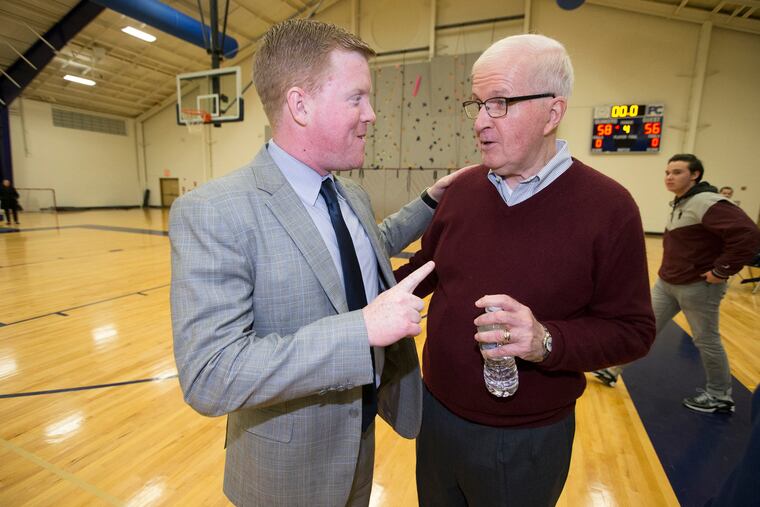For beloved basketball coach Speedy Morris, a career of giving back to the sport
On the brink of his final game, the long-time coach is revered for his career-long willingness to help others.

In the early 1970s, Speedy Morris and Bob Hurley were two young basketball coaches at a clinic in Valley Forge.
“That was the biggest clinic on the East Coast,” said Hurley, the former coach at St. Anthony High School of Jersey City and a member of the Naismith Basketball Hall of Fame. “Speedy and I would go to clinics together, talk basketball, listen to these older coaches.”
The keynote speaker at the clinic that year was UCLA coach John Wooden, who was in the middle of the greatest run in NCAA Tournament history with 10 national championships in 12 seasons from 1964 to 1975.
But what struck Hurley and Morris was not what Wooden said during the clinic. It was what he did afterward.
“He would go in a sit in a coffee shop and just talk to coaches,” Hurley said. “He would sit there for two hours and answer any coach’s question.
“Speedy and I saw that. It taught us something.”
As the 77-year-old Morris approaches the end of his illustrious career, much of the focus has been on his accomplishments: the 1,035 victories over 52 seasons at Roman Catholic, Penn Charter, La Salle University (as coach of both the women’s and men’s teams), and St. Joseph’s Prep.
But in basketball circles, Morris is beloved not just because of the success of his teams. He’s revered because of his willingness to swap stories, share wisdom and compare notes with other coaches.
“Always open to helping anybody, any coach,” Archbishop Wood coach John Mosco said. “In the league, out of the league. It doesn’t matter. He is just there for basketball.”
Morris is finishing his 19th and final season at St. Joseph’s Prep. The Hawks visit La Salle in the regular-season finale on Sunday before entering the Philadelphia Catholic League playoffs.
Morris announced in early December that he would retire at the end of this season, citing health issues.
Sitting in his office off Kelly Field House on the St. Joseph’s Prep campus earlier this week, Morris said he hoped that his willingness to help players and coaches had been a defining aspect of his career.
“I’ve never turned anyone down that I know of,” Morris said. “If anyone asked for help, I always was there for them.
“I went to a lot of coaches, helped out, put in a press, put in an offense, stuff like that.
“That’s something I think that everybody should do. Morgan [Wooten, the late coach at DeMatha Catholic] was like that. Bobby Hurley was like that. I tried to be like that.”
Holy Cross Prep (N.J.) coach John Valore, a Southern High graduate, remembers when one of his top players, Chris Santo, wanted to meet Morris.
“I asked Speedy if he could say hello to this kid,” Valore said. “Speedy must have talked to him for 10-15 minutes.”
Morris has been renowned for years for speaking, free of charge, at communion breakfasts, sports banquets, camps, clinics, and club gatherings in and around Philadelphia. He was there for young coaches to discuss the cuts on an offensive set, the slides on a zone press, the best way to reach a surly senior or a sensitive sophomore.
“He has consistently been a sounding board and has helped me get every coaching job that I’ve gotten,” said Bonner-Prendergast coach Kevin Funston, who played for Morris at St. Joseph’s Prep.
Westtown coach Seth Berger remembers Morris’ team running “a clinic” against his team in a summer event early in his career.
“After the game, Speedy was encouraging of this young coach and his team and he let me know Westtown was on the right path,” Berger said. “No gloating, just a handshake and some kind words. All class.”
Hurley, who retired after winning more than 1,100 games at St. Anthony, believes Morris’ career-long willingness to give back to basketball can be traced to that clinic at Valley Forge.
That’s when Hurley and Morris watched the man regarded as the greatest college coach of all time sit in a coffee shop and talk basketball for hours with a bunch of high school and youth-level coaches.
“When you have some success, some experience, you want to share that,” Hurley said. “We’ve taken from others. You want to pass it along. That’s what you should do."